GREECE
Good Times in Timeless Places
Welcome to Greece, the country that will unlock all your senses!
Greece has history, culture and beaches – not to mention the food and wine. It’s a great holiday destination for families, friends, couples, and solo travelers, and it is an ideal spot in spring, summer, and fall. Greece has more than 6.000 islands in total scattered in the Aegean and Ionian Seas, of which 227 are inhabited. It also flaunts a total of 16.000 km coastline and the best beaches in Europe.
As we are almost spoiled for choice, here below we have selected some destinations based on various interest groups.
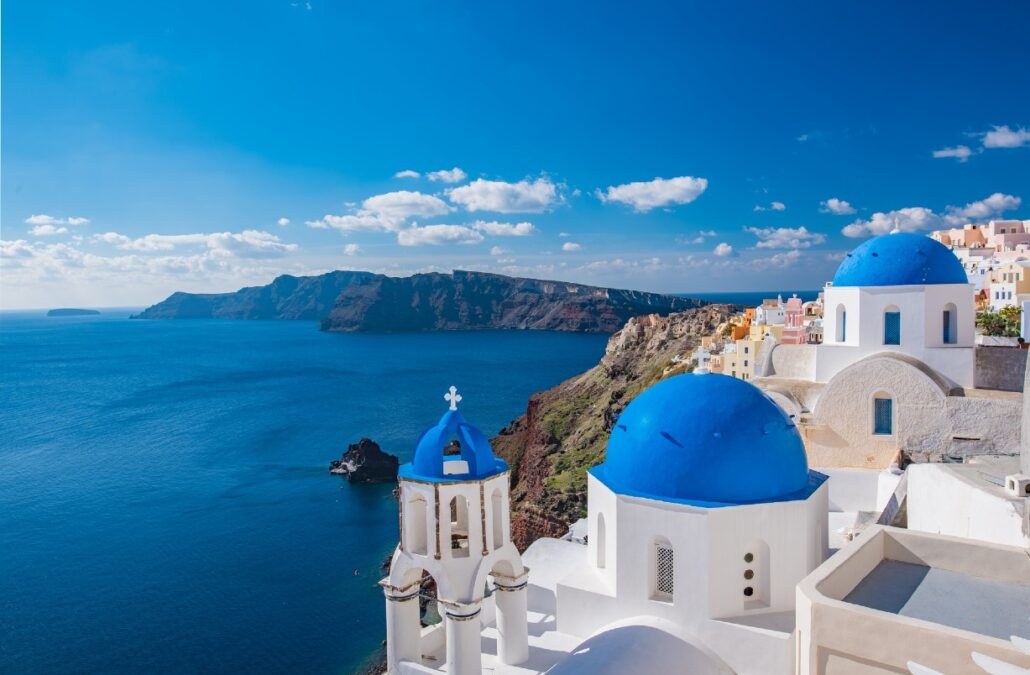
FIRST-TIME VISIT TO GREECE
Your first trip to Greece is the start of something special—a journey into a land where ancient legends meet sun-drenched islands, and every corner offers a new reason to fall in love. Whether you’re drawn by history, beaches, food, or the iconic blue-and-white scenery, Greece welcomes first-timers with open arms.
Start in Athens, where the mighty Acropolis watches over a city that’s as lively as it is historic. Wander through ancient ruins by day, and by night, enjoy rooftop dinners with views that feel straight out of mythology.
From there, choose your adventure: the romantic cliffs of Santorini, the beachy buzz of Mykonos, the cultural richness of Crete, or the laid-back charm of Naxos or Paros.
Expect to eat incredibly well—fresh seafood, warm pita, olive oil-soaked everything—and drink even better (don’t miss a chilled glass of ouzo or a crisp local wine). Greeks are openhearted and friendly, and even a few words like kalimera (good morning) or efharistó (thank you) go a long way.
Travel is easy, with island-hopping ferries, domestic flights, and warm weather most of the year. And while Greece has plenty of famous sites, don’t be afraid to slow down. Often, the best moments happen while sipping coffee in a quiet square or discovering a tucked-away taverna where yiayia (grandma) is doing the cooking.
Your first time in Greece won’t be your last. Because once you’ve felt the sun and shared laughs with locals, Greece has a way of staying with you forever.
Here is what a first-timer’s itinerary might look like:
Athens • Santorini • Mykonos • Paros • Naxos • Crete • Rhodes
“Start with two nights in Athens, time for the requisite Acropolis and Parthenon visits, plus dinner at one of the famous Roof Garden Restaurants. Then head towards the Cyclades, to Mykonos and Santorini, the twin stars of many Greek island dreams, and home to some of the country’s best hotels and restaurants.”
Athens, the capital of Greece, is a large city stretched along the southern coast of the mainland, with very mild weather all year round. Its historical significance, the archaeological sites, shops, museums, its upscale seaside neighbourhoods on the Athenian Riviera, delicious restaurants and its proximity to the islands is what makes it ideal for first-timers.
Santorini is a volcanic island offering some of the world’s most dramatic sea views, lovely boutique hotels and exquisite restaurants.
Mykonos is considered the Greek sister of Ibiza with a wild partying nightlife and an international jet set scene. Numerous beautiful beaches with stylish beach bars, a charming traditional town, luxury hotels and private villas and large yachts characterise this island. Paros and Naxos are two islands in very close proximity. Their location makes them sisters but their definitive characters are quite different from one another. Both flaunt shimmering sandy beaches, wonderful whitewashed villages and excellent hotel options.
Crete and Rhodes are two very different islands, but both are considered as perfect destinations for first-timers since they boast unparalleled seashores and picturesque villages and a well organised tourist infrastructure with international airports.
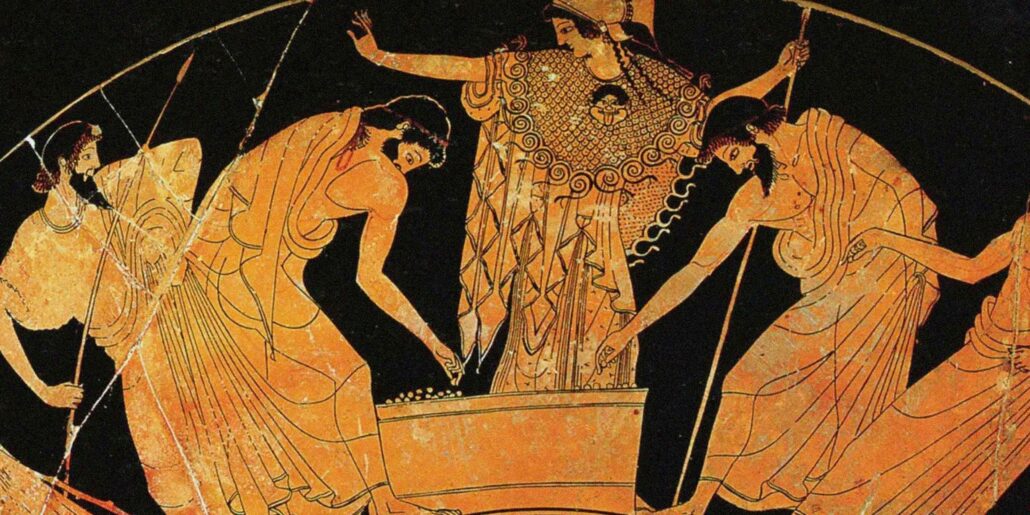
HISTORY & CULTURE
Greece is a living museum—where ancient ruins whisper tales of gods and heroes, and everyday life is infused with centuries-old traditions. From the birthplace of democracy to the spiritual heart of Orthodox Christianity, Greece’s history and culture are as deep and captivating as its blue seas.
Begin in Athens, where the iconic Acropolis stands proudly over a city that seamlessly blends classical and contemporary life. Walk the same marble paths as Socrates and Plato, then step into a modern gallery or sip coffee in a buzzing square just a stone’s throw from 2,500-year-old temples.
But Greece’s rich past goes far beyond the capital. In Delphi, once considered the center of the world, you can stand where ancient pilgrims sought the wisdom of the Oracle. In Crete, the Minoan Palace of Knossos reveals Europe’s oldest civilization, with colorful frescoes and labyrinthine halls that inspired the myth of the Minotaur. And in Vergina and Thessaloniki, Macedonian tombs and Roman rotundas highlight Greece’s role in the Hellenistic and Byzantine worlds.
Cultural life in Greece isn’t confined to museums—it’s lived. Traditional music like bouzouki echoes through the islands, while local festivals (called panigyria) bring entire villages together in celebration, often with dancing, food, and stories passed down through generations. Greek Orthodox churches, with their striking domes and gold interiors, remain central to daily life, especially in smaller towns.
Whether you’re tracing history through ruins, tasting it in a family recipe, or feeling it in a local dance circle, Greece offers a culture that’s vibrant, authentic, and always connected to its roots.
Athens • Crete • Delphi • Epidaurus • Mycenae • Mystras • Olympia
Greece is a country that counts more than 4000 years of history: from the Bronze age, the ancient classic years, to the Roman and Byzantine Empires.
In Athens, Crete, Delphi, Epidaurus, Mycenae, Mystras and Olympia you will find royal palaces, theatres, temples, royal tombs, monasteries and stadiums that testify to the very rich heritage of this land. Most of these monuments are UNESCO world heritage sites and are considered as some of the most notable constructions of humanity
|
There are many different ways to learn Greek Culture and Mythology. Here are a few experiences that we can organise for your trip to Greece. |
|
|
Guided tours: Minoan, Mycenaean, Classical Greece |
UNESCO World Heritages: https://whc.unesco.org/en/statesparties/gr |
|
Cultural walking tours |
Greek Mythology: Gods, Myths and Heroes |
|
Game tours: History & Mythology |
The foundations of Democracy |
|
Travel through History: from ancient to modern Greece |
Ancient Greeks in Science: Mathematics, Astronomy, Physics, Medicine |
|
Greek Temples: The Triangle Athens-Sounion-Aegina |
Greek Ceramic tradition: pottery classes |
|
Greek Theatre: Learn about the Greek theatre and take part in an ancient Greek Tragedy |
Byzantine art and history |
|
Philosophy & Poetry readings |
The Orthodox Church and its icons: Iconographers & Monasteries |
|
Sculpture and Painting classes |
The Steps of Saint Paul in Greece |

BEST FOR FAMILIES
Greece is a dream destination for families—a place where history comes to life, beaches stretch for miles, and every meal feels like a celebration. With its welcoming locals, kid-friendly culture, and a mix of adventure and relaxation, Greece offers unforgettable experiences for travelers of all ages.
Start your journey in Athens, where mythology and history leap off the pages as you explore the Parthenon or watch the Changing of the Guard in Syntagma Square. Many museums here offer interactive exhibits designed just for kids—think treasure hunts through ancient artifacts and hands-on workshops in traditional crafts.
Then head to the islands, where family fun is as endless as the horizon. Crete is a favorite for its mix of shallow beaches, outdoor adventures, and cultural sites like the Palace of Knossos. Naxos and Paros offer laid-back vibes, calm waters perfect for little swimmers, and plenty of room to roam without big crowds. In Rhodes or Corfu, you’ll find medieval castles to explore, scenic bike paths, and boat trips to hidden coves.
Greece also makes mealtime a breeze for families. From seaside tavernas to mountain village cafés, kids are welcomed with open arms and hearty portions of souvlaki, fresh bread, and homemade desserts. And when you need a break? Relax in a family-friendly resort with pools, activities, and babysitting services—so parents can enjoy a little ouzo time too.
With sun, stories, and smiles around every corner, a family holiday in Greece is more than a getaway—it’s a memory-maker for every generation.
Naxos • Paros • Rhodes • Nafplion • Crete • Halkidiki
Greece is a common travel destination for families. Those places are all highly recommended summertime destinations to pick from when planning a fun, quality family vacation. They all flaunt comfort, easy access to fascinating beaches with safe, pristine and shallow waters; tourist amenities and facilities can be located in close proximity to almost every bay.
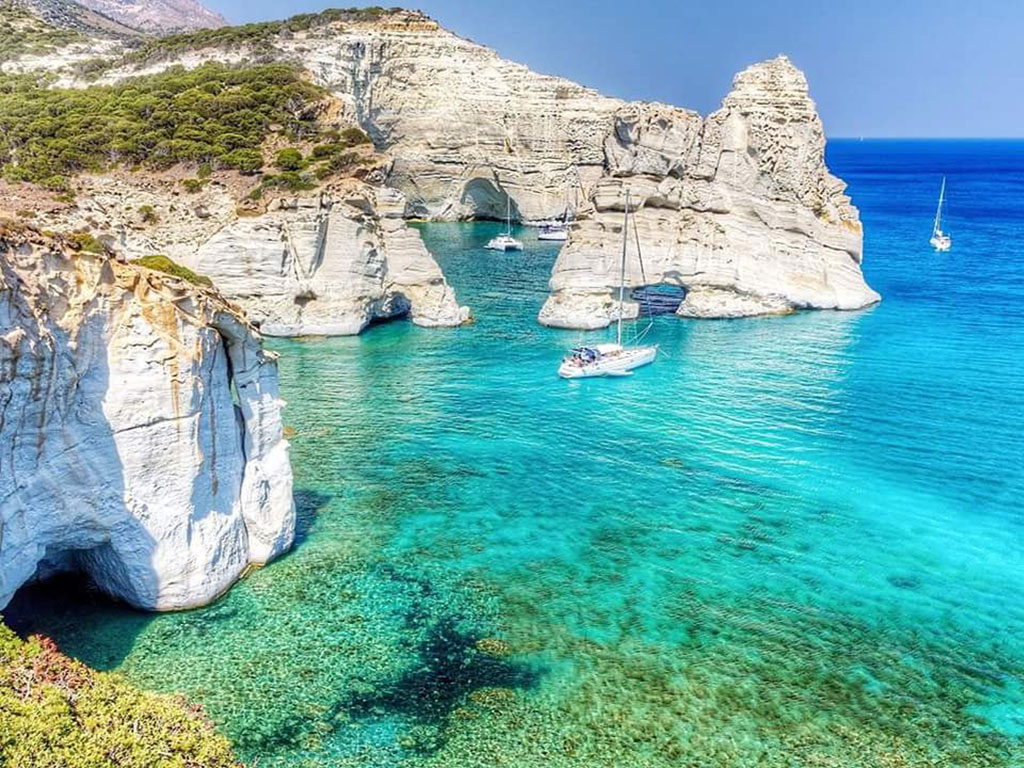
BEST BEACHES
Crystal-clear waters are an imperative feature of the Greek islands, although some beaches may be ranking higher than others. It is only natural that according to this, some islands are more favoured than others.
Milos • Paros • Koufonisia • Crete • Rhodes • Lefkada • Zakynthos (Zante) • Skiathos • Kefalonia • Paxos • Mykonos • Naxos • Ios
Mykonos has more than 28 sandy beaches with clear and calm waters. Naxos’s west coastal side extends into a more than 9km beach that hardly ever gets crowded. Ios, although an island that tends to become busy during summer, has managed to keep some of the most fantastic beaches of the Aegean away from the spotlight.
With thousands of islands and a sun-kissed coastline stretching over 13,000 kilometers, Greece is a beach lover’s paradise. Whether you’re into wild, remote shores or lively stretches with loungers and cocktails, Greece has a perfect beach with your name on it.
1. Navagio (Shipwreck Beach), Zakynthos
Possibly the most iconic beach in Greece—an electric-blue cove surrounded by towering white cliffs, only accessible by boat. A shipwreck rests dramatically on its soft white sands, making it one of the most photographed spots in the country.
2. Elafonissi Beach, Crete
A dreamlike beach where pink-tinged sand meets shallow, turquoise lagoons. Ideal for families and those who love wading in warm, gentle waters. A protected nature reserve with a tropical vibe.
3. Sarakiniko Beach, Milos
Otherworldly and unforgettable—Sarakiniko feels like walking on the moon. Smooth, white volcanic rock formations contrast with deep blue waters, making it a must-visit for photographers and swimmers alike.
4. Myrtos Beach, Kefalonia
Famous for its dramatic scenery, Myrtos is nestled between steep cliffs and sparkles in brilliant shades of blue. Best admired from above before making your way down for a swim in one of the Ionian’s finest bays.
5. Porto Katsiki, Lefkada
A postcard-perfect beach backed by vertical white cliffs and accessible via a scenic staircase. The Ionian Sea here is deep, cool, and vividly blue—perfect for swimming and sunbathing.
6. Simos Beach, Elafonisos
An untouched double bay with powdery sand and crystal-clear water, Simos feels like a secret escape. It’s popular with campers and nature lovers but still feels wonderfully wild.
7. Super Paradise Beach, Mykonos
For those who want their beach day with a side of party, Super Paradise is where it’s at. Dance, drink, and lounge in style at one of the most iconic beach clubs in the Aegean.
8. St. Paul’s Bay, Rhodes
A small, tranquil beach near Lindos, set within a heart-shaped cove. Crystal waters, historical surroundings, and a laid-back vibe make it ideal for couples and romantic getaways.
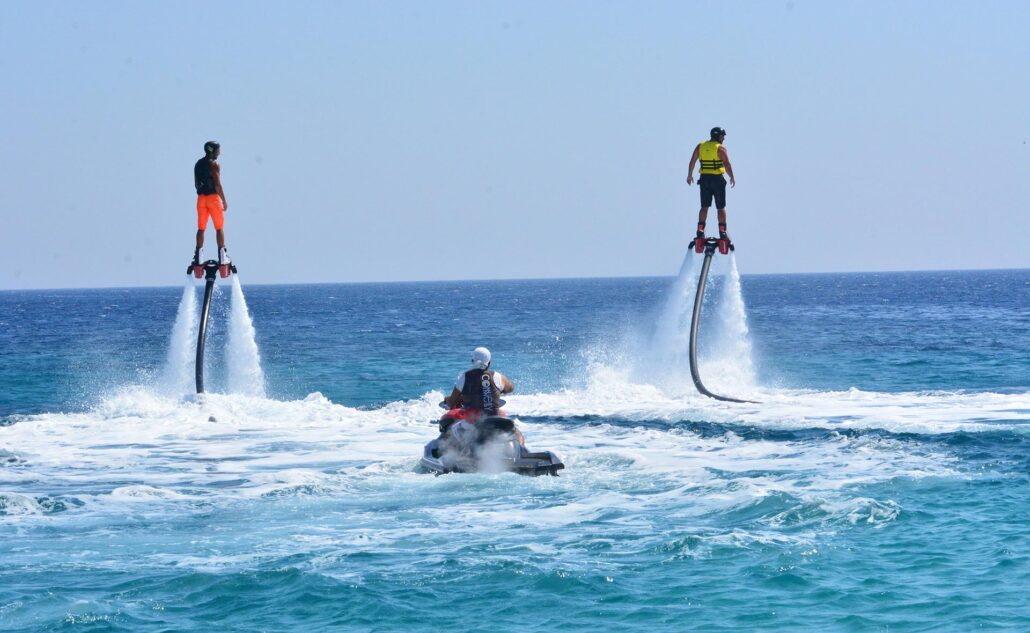
WATERS SPORTS
A few islands where the ideal weather conditions are met, have developed into hubs for adrenaline hunters and sports enthusiasts.
Naxos, Lefkada, Paros, Mykonos, Crete, Rhodes, Lemnos and Kos have the perfect seashores for that. Windsurfing and kitesurfing schools exist on the bays, offering you lessons or may rent sports equipment. A very committed community has been created over time, visiting on a yearly basis. If you want to enjoy some kitesurfing or windsurfing sessions on a beautiful island, you now know where to go.
With its crystal-clear waters, sun-drenched coastline, and countless islands, Greece is a playground for water sports lovers of all kinds—from adrenaline junkies to casual thrill-seekers, here’s a list of suggestions for you:
Windsurfing & Kitesurfing – Paros, Naxos, and Rhodes
The steady Meltemi winds of the Aegean make the Cyclades and Dodecanese islands ideal for wind sports. Paros (especially Golden Beach) and Naxos offer top-notch conditions and schools for all levels, while Prasonisi in Rhodes is a kitesurfing paradise with two seas meeting on one sandy strip.
Scuba Diving & Snorkeling – Crete, Zakynthos, and Kalymnos
Explore underwater caves, ancient shipwrecks, and reefs teeming with marine life. Crete has dramatic drop-offs and WWII wrecks, while Zakynthos is known for spotting sea turtles in Laganas Bay. For advanced divers, Kalymnos is legendary for its sponge-diving heritage and rich dive sites.
Sea Kayaking – Pelion, Halkidiki, and Corfu
Paddle through turquoise waters, sea caves, and hidden beaches. The coastlines of Pelion and Halkidiki offer gentle waters and stunning backdrops perfect for family-friendly excursions. In Corfu, you can kayak to secret coves and cliffside monasteries.
Jet Skiing, Parasailing & Banana Boats – Mykonos, Santorini, and Kos
For fast-paced fun, head to the lively beach resorts of Mykonos or Kos, where water sports centers offer everything from jet skiing and flyboarding to parasailing with panoramic island views. Santorini adds a dramatic twist—ride a jet ski across the caldera and volcanic shores.
Sailing & Catamaran Cruises – Everywhere!
From luxury catamaran cruises in the Cyclades to traditional wooden sailboats in the Ionian, sailing is one of the most iconic ways to explore Greece. Charter a boat, join a group tour, or even learn to sail—it’s the ultimate way to island-hop at your own pace.
|
Here are a few ideas: |
|
|
Swimming, snorkeling, sunbathing, coves, bays, beach bars, sunsets, … Nature pure! |
Island hopping: enjoy the endless sea and eternal Greek sun |
|
Water Toys: water ski, SUP, sea bob, jet ski, jet packs, tubes, wakeboard, parasailing, |
Fishing: spend a day with the Greek fishermen |
|
Sea & River: Kayak, canoeing, river rafting |
Treasure Hunts at sea with pirate boat |
|
Scuba diving: dive to underwater archeological sites |
Surfing: Windsurf, Kite surf, surf |
|
Freediving |
Boats: Sailing, cruising, yachting |
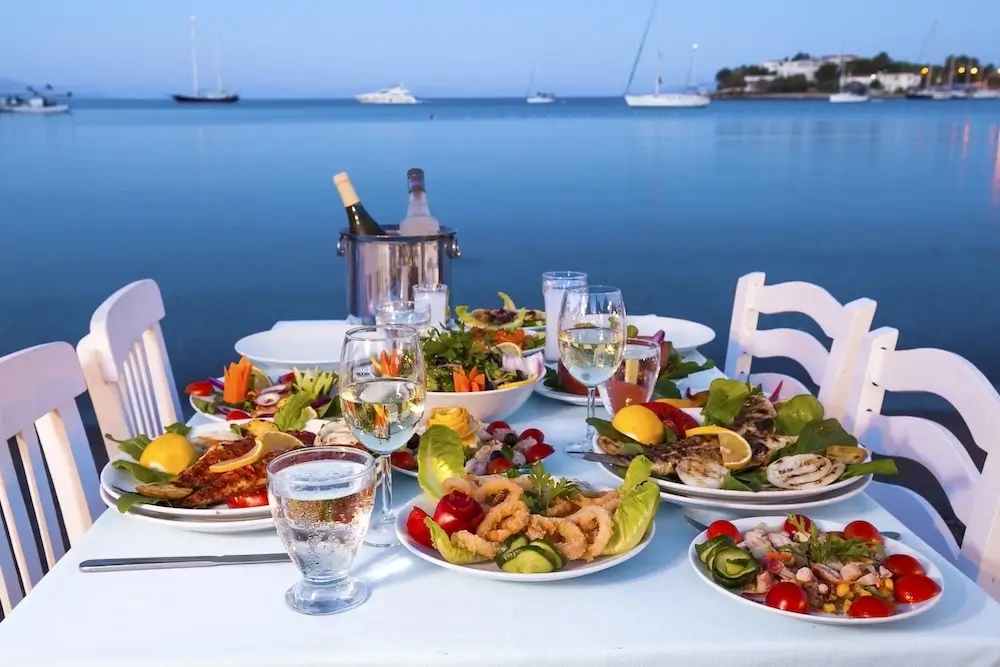
GASTRONOMY & EXQUISITE RESTAURANTS
Greek cuisine is a feast for the senses—sun-ripened ingredients, deep-rooted traditions, and a growing wave of innovative chefs blending old and new. Whether you’re dining by the sea or in the heart of a historic village, Greece offers a culinary journey that’s as soulful as it is sophisticated.
From farm-to-table tavernas to Michelin-starred marvels, Greek gastronomy has evolved into a world-class experience. In Athens, you can dine atop rooftops with views of the illuminated Acropolis, savoring dishes that fuse ancient recipes with modern flair—think octopus carpaccio with citrus foam or lamb slow-cooked in ouzo reduction. Head to Thessaloniki, the country’s culinary capital, for rich meze culture and inventive street food elevated to an art form.
On the islands, the flavors shift with the tides. In Crete, taste earthy mountain herbs, wild greens, and golden olive oil pressed from trees older than cities. Santorini offers fine dining perched on volcanic cliffs, where local tomatoes, capers, and fava beans are transformed into gourmet delicacies alongside crisp Assyrtiko wine grown in ash-rich soil. Meanwhile, in Mykonos, exclusive beach clubs and designer restaurants serve sea urchin risotto and lobster pasta with a side of sunset glamor.
What makes Greek fine dining truly special isn’t just what’s on the plate—it’s the passion behind every dish, the pride in regional ingredients, and the warmth of Greek hospitality that turns every meal into a celebration.
Crete • Naxos • Tinos • Lesvos • Chios
Greek cuisine is super popular for its healthy, hearty meals and delicious fresh products. Some islands have a more emphasized gastronomic scene due to their fertile soil, local products and recipes. If you appreciate quality meals and want to savor memorable culinary experiences, then these islands welcome you to their delicious tavernas and invite you to taste their local cheese types, wine varieties, fresh seafood and meat dishes.
Mykonos • Santorini • Rhodes • Athens • Corfu • Crete
Fresh ingredients, talented chefs and beautiful settings is what makes a good restaurant. The above places have amazing, award-winning establishments with Greek, Mediterranean and Ethnic cuisines to die for. If you want to enjoy upscale dinners these are the places to go.
|
The Greek Gastronomy offers a great variety of activities you can get involved |
|
|
Cooking classes: traditional Greek recipes: Grandma’s pittas, moussaka, pastitsio, Gemista (stuffed vedgetables) Dolmades (vine leaves) |
Olives: Olive Oil and the Olive Farm |
|
Greek sweets and desserts |
Greek beekeepers and their honey production |
|
Figues & marmelade |
Greek mountain herbs: Chorta & Votana |
|
Pistachios and its derivatives |
Greek wines and wine production |
|
Greek liquors: Mavrodafni, Masticha & more |
Greek distillates: Raki, tsipouro, tsikoudia |
|
Greek cheese: Feta & more from the goat to your table – sound a day with a Greek shepherd |
Ouzo & Mezedes: how Greeks can spend a whole day around the table |
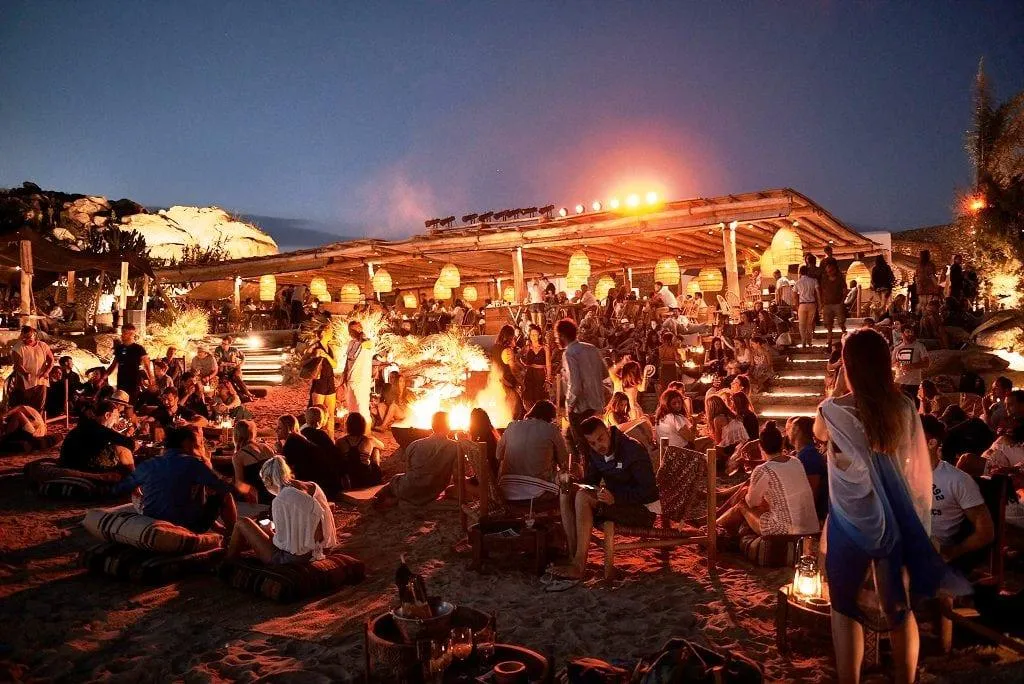
NIGHTLIFE & PARTY
Whether you’re after high-end glamor, island freedom, or urban cool, Greece knows how to throw a party—and you’re always invited
Mykonos • Ios • Kos • Zakynthos • Skiathos • Heraklion (Crete)
If beach clubs, bars and fun from dusk till dawn is what you have in the plans for your summer holiday then these islands are the party hubs of Greece and welcome people from all around the world every summer.
When the sun dips below the horizon, Greece turns up the volume. From beach parties that go till dawn to chic rooftop bars with Acropolis views, Greece’s nightlife is as legendary as its ancient ruins—and just as worth exploring.
Mykonos is the undisputed king of the Greek party scene. Think Champagne showers at Nammos, world-class DJs at Cavo Paradiso, and beach parties at Paradise Beach that start with cocktails in the sun and end with dancing under the stars. Here, glamour and hedonism go hand-in-hand.
Ios is the youthful rebel of the Cyclades, known for its carefree energy, affordable fun, and vibrant bar-hopping in Chora. Start your night with sunset drinks at Pathos, then follow the music through narrow alleyways packed with pubs and open-air dance floors.
Athens surprises many with its edgy, creative nightlife. Rooftop bars in neighborhoods like Monastiraki and Psirri offer craft cocktails and unbeatable views of the illuminated Acropolis, while underground clubs in Gazi serve up techno, house, and late-night revelry.
Thessaloniki, Greece’s second city, has a soulful nightlife scene steeped in music and mezze. From rebetiko tavernas and wine bars to waterfront clubs, the vibe is local, lively, and unapologetically fun.

AUTHENTIC GREEK LIFESTYLE
To truly know Greece, you have to live it—not just visit it. The authentic Greek lifestyle is about slowing down, connecting with people, savoring the moment, and immersing yourself in traditions that are deeply woven into daily life.
Wake up in a sun-drenched village, where mornings begin with strong Greek coffee and fresh bread from the fournos (local bakery). Stroll through markets bursting with seasonal produce, fragrant herbs, and cheeses made just up the road. Whether you’re on a quiet island or in the hills of the Peloponnese, life moves to a gentle rhythm—and you’re invited to join in.
Spend your afternoons like a local: sipping frappé at a seaside café, chatting with friendly locals (who will always try to feed you), or taking a siesta before the real magic begins. Evenings are for kefi—the joyful spirit that defines Greek gatherings. Enjoy long, lingering dinners filled with meze, wine, laughter, and spontaneous dancing when the mood strikes (which it often does).
To dive even deeper, visit during a village panigyri (festival), where locals celebrate with food, music, and dance late into the night. Learn a few Greek phrases, join in the circle dance, and you’ll be treated like family. And don’t be surprised if you’re invited to a name day celebration—more important than birthdays in Greece!
Living like a Greek means valuing community, tradition, and the beauty of everyday life. It’s not about seeing more; it’s about feeling more.
Karpathos • Amorgos • Nisyros • Ikaria • Kythera • Chios • Lesvos are islands that have managed to preserve a more authentic lifestyle than others. Average levels of tourism infrastructure accommodated along with centuries-old traditions and a vivid local life have given to these islands their distinctive authentic Greek atmosphere. During the summer months, don’t be surprised if you encounter the religious feasts called “panigiri” where locals and tourists dance, eat and drink together celebrating Orthodox commemorations.
LEARN LOCAL CUSTOMS

Greek Coffee Tradition
The Greek Coffee Tradition: More Than Just a Drink
In Greece, coffee isn’t just a beverage—it’s a ritual, a social anchor, and an unhurried moment of connection. Whether you’re sipping it in a bustling city square or a sleepy island village, Greek coffee (ellinikós kafés) is about slowing down and savoring life.
Served in a small cup, Greek coffee is strong, unfiltered, and prepared in a briki—a tiny copper pot heated slowly over a flame or hot sand. The process is precise: finely ground coffee, cold water, and optional sugar are stirred together until they foam, but never boil. The result is a rich, velvety brew with a layer of crema on top and thick grounds that settle at the bottom (no stirring once served!).
You’ll often be asked how sweet you want it:
-
Sketos (no sugar),
-
Metrios (medium),
-
Glykos (sweet),
-
or Variglykos (very sweet).
But it’s not just about taste—it’s about time. Greeks can sit over one coffee for hours, talking politics, philosophy, or just people-watching. It’s common to see groups gathered at kafeneia (traditional cafés), where generations mix and conversations stretch long into the day. Even the fortune-telling custom of reading the coffee grounds (kafemanteia) after finishing a cup still lingers in some homes and villages.
Whether you’re catching up with friends or sitting solo with the sun on your cheeks, drinking Greek coffee is a gentle reminder: slow down, be present, and enjoy the moment.
Learn how to cook Greek coffee, how to drink it properly and how to read your future at the bottom of the cup.
Greek Language Lessons for Visitors: Speak Like a Local (Just a Little!)
Either prior or during your trip to Greece you might want to learn something more about the Greek language. While many Greeks speak English learning a few basic Greek words and phrases can go a long way. It’s a sign of respect, sparks smiles, and often opens doors to more genuine interactions. Greek might look a bit intimidating at first (thanks to its unique alphabet), but spoken Greek is surprisingly melodic and fun to try.
You don’t need to be fluent—just a few words can bring a big smile. Greeks love it when visitors try, and they’ll often help you along the way.
Here are some essential words and phrases to help you feel more at home:
👋 Basic Greetings
-
Kaliméra (kah-lee-ME-ra) – Good morning
-
Kalispéra (kah-lee-SPE-ra) – Good evening
-
Kaliníhta (kah-lee-NEEK-ta) – Good night
-
Yiá sou (YAH-soo) – Hello / Hi (informal)
-
Yiá sas (YAH-sas) – Hello / Goodbye (formal or plural)
🙏 Politeness Matters
-
Efharistó (eff-kha-ree-STOH) – Thank you
-
Parakaló (pa-ra-ka-LOH) – Please / You’re welcome
-
Signómi (seen-GNO-mee) – Excuse me / Sorry
-
Nai (neh) – Yes
-
Ochi (OH-hee) – No
🍽️ Eating Out
-
To logariasmó, parakaló? – The bill, please?
-
Neró – Water
-
Krasi – Wine
-
Kafés – Coffee
-
Kaliòrexi! – Enjoy your meal!
🚕 Getting Around
-
Pou íne…? – Where is…?
-
Stathmós – Station
-
Paralía – Beach
-
Domátio – Room
-
Vriskóme hamenos/hameni. – I’m lost (male/female speaker)
❤️ Sound Like a Local
-
Kefi – Joyful spirit or good vibes
-
Filoxenía – Greek hospitality, love for strangers
-
Yamas! – Cheers! (literally “to our health”)
Would you like a printable phrase sheet or audio pronunciation guide to practice with?
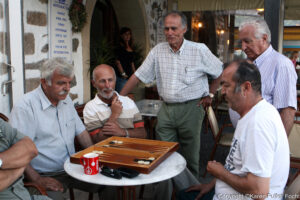
Tavli – Backgammon
Backgammon in Greece:
In Greece, tavli (τάβλι)—the Greek name for backgammon—isn’t just a game; it’s a social ritual woven into daily life. From lively seaside cafés to shady village squares, you’ll often hear the rhythmic clack of dice and the occasional triumphant shout from locals engaged in passionate matches.
Tavli is typically played between two people and comes in three main variations: Portes, Plakoto, and Fevga—all played on the same board but with different rules and strategies. Many Greeks master all three, switching versions mid-session or playing best-of-three tournaments over coffee, ouzo, or endless conversation.
The game’s appeal lies in its perfect balance of luck, skill, and banter. It’s common to see retirees, young people, and even strangers bond over a spontaneous match. There’s friendly competition, lots of teasing, and always time for another round.
Watching a tavli game in Greece feels like tapping into the heartbeat of everyday culture—slow, social, strategic, and full of personality. It’s a reminder that sometimes, the best part of a trip isn’t seeing the sights—it’s sitting still and sharing a moment of life the Greek way.
Would you like to learn the basic rules of tavli or how to join a local game while visiting?

Mati – Evil Eye Tradition
The Evil Eye in Greece: Protection with a Stare
In Greece, the mati (μάτι), or “evil eye,” is more than just a pretty blue charm—it’s a centuries-old belief that has woven itself into daily life, culture, and even fashion. Whether you spot it dangling from necklaces, hanging in homes, or painted on fishing boats, the mati is everywhere—and always watching.
The tradition stems from the belief that envy or admiration—especially if it’s intense or unspoken—can cause misfortune, bad luck, or illness. This “curse of the eye” is usually unintentional, but powerful nonetheless. The solution? Protection in the form of a blue eye amulet, said to reflect the bad energy back to its source and keep you safe.
You’ll often hear people say «faskané!» (a verbal expression to ward off the eye) or see them make a small spitting gesture (a sound more than actual spitting) to prevent bad luck after giving a compliment, especially to children or beautiful things.
For those who believe they’ve been “struck” by the eye—matiasméno—there’s even a traditional ritual of removal (xematiasma), often passed down through families. Someone who knows the prayer (usually a grandmother) recites it in secret, often over a glass of water, until the symptoms—headache, fatigue, or just “feeling off”—are said to lift.
Whether you see it as spiritual protection, cultural expression, or just a meaningful souvenir, the mati is one of the most recognizable and beloved symbols of Greece—a watchful, beautiful little guardian with ancient roots and modern charm.
Would you like to know where to buy authentic mati jewelry or gifts in Greece?
 Komboloi: The Rhythmic Art of Relaxation in Greece
Komboloi: The Rhythmic Art of Relaxation in Greece
The soft click-clack of beads in hand is a familiar sound across Greece—on a quiet island street, in a bustling café, or from the hands of an old man sitting by the sea. This is the komboloi (κομπολόι), or Greek worry beads: part meditation tool, part cultural tradition, and a small but powerful symbol of everyday Greek life.
Despite their name, komboloi aren’t tied to religious use like rosaries. Instead, they’re used to pass the time, calm the nerves, or simply enjoy a pleasant rhythm. Often made of amber, glass, wood, or even coral, each komboloi is strung with an odd number of beads (often 17 or 23) and ends in a knot or tassel.
Playing the komboloi is more art than game. There are various styles:
-
Quiet flicking, where beads roll between fingers.
-
Rhythmic swinging, where a section of beads strikes the others in a satisfying rhythm.
-
And the «louder» flip, often used for flair or stress relief, with beads hitting the palm or flipping over the back of the hand.
While traditionally more popular among older men, komboloi has become a stylish accessory and stress-relief tool for all ages. You’ll find beautiful handcrafted versions in souvenir shops and specialty stores throughout Greece, especially in cities like Nafplio and Athens.
More than just a keepsake, the komboloi is a tiny, tangible piece of Greek culture—calm, cool, and endlessly charming.
Would you like tips on how to use komboloi or where to find authentic handmade ones?
 Bouzouki & Dancing: The Soulbeat of Greece
Bouzouki & Dancing: The Soulbeat of Greece
When the sun sets and the music rises, Greece truly comes alive—and at the heart of that spirit is the sound of the bouzouki. This iconic stringed instrument, with its bright, soulful twang, is the heartbeat of Greek music, especially in genres like rebetiko and laiko. Whether it’s echoing through a seaside taverna or leading a full-blown celebration, the bouzouki stirs something deep in every listener.
Its melodies are often bittersweet—joyful and melancholic all at once—telling stories of love, loss, passion, and resilience. Played with speed and flair, the bouzouki sets the rhythm for the night, inviting everyone to join in the music not just with their ears, but with their whole body.
And when the bouzouki plays, the dancing begins.
Greek dancing isn’t just performance—it’s participation. From the famous sirtaki (often mistakenly called «Zorba’s dance») to regional circle dances like kalamatianos and tsamikos, it’s all about connection. Dancers hold hands or shoulders, move in rhythmic patterns, and build intensity with each step. No experience? No problem. In Greece, if you’re near music, you’re welcome to join. Someone will pull you in, guide your steps, and before you know it, you’re laughing and spinning like a local.
Whether you’re watching a spontaneous dance break out at a taverna or clapping along at a village panigyri (festival), bouzouki and dancing offer a direct line to Greece’s soul—fiery, proud, and full of life.
Would you like suggestions on where to experience live bouzouki music or traditional dance shows in Greece?
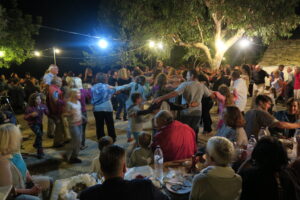 Greek Panigiri: A Feast for the Senses and the Soul
Greek Panigiri: A Feast for the Senses and the Soul
To truly feel the spirit of Greece, skip the guidebooks and find yourself at a panigiri—a traditional village festival where music, dancing, food, and community come together in one joyful celebration. Rooted in religious holidays and local saints’ feast days, panigiria (plural) are not just events—they’re an experience.
From the mountains of Epirus to the islands of the Cyclades, every village has its own way of celebrating. The heart of it all? Live music, typically led by the bouzouki or island violin, with singers belting out folk songs that everyone seems to know by heart. As the night deepens, the dancing begins, often in massive circles, with old and young linking arms and moving to the beat of centuries-old rhythms.
And then, there’s the food—long communal tables piled with grilled meats, homemade bread, feta, olives, and free-flowing local wine or tsipouro. You may even be offered a shot by a stranger before being pulled into the next round of dancing.
Panigiria often start in the early evening and go well into the early morning, especially in summer. It’s sweaty, loud, sometimes chaotic, and always full of warmth and welcome. Tourists are not only invited—they’re embraced. There’s no better way to witness Greek hospitality and local culture at its most unfiltered and alive.
Would you like a list of the most famous panigiria by region or when and where to attend one during your visit?

LUXURY HOLIDAYS
A luxury holiday in Greece is where ancient elegance meets modern indulgence, wrapped in sun-drenched landscapes and Aegean-blue waters. Picture yourself waking up in a cliffside suite in Santorini, where your private infinity pool seems to spill into the sea, and breakfast arrives with fresh-squeezed juice and panoramic caldera views. Or perhaps you’re sailing the Cyclades on a private yacht, hopping between hidden coves and charming island villages at your own pace.
Luxury here isn’t just about five-star resorts—though Greece has plenty of those. It’s about personalized service, gourmet dining with a side of mythology, and exclusive access to experiences most travelers never see: a private tour of the Acropolis after hours, a wine tasting in a centuries-old vineyard in Nemea, or a helicopter ride over the sparkling Ionian coast.
From ultra-chic beach clubs in Mykonos to tranquil hideaways in Crete and wellness retreats nestled in the Peloponnesian hills, Greece offers a rich mix of culture, comfort, and coastal glamor for travelers seeking the finer things—served with a side of warm Greek hospitality.
Mykonos • Santorini • Rhodes • Northern Crete • Corfu • Halkidiki
If you want to pamper yourself with a well-deserved summer getaway to a lavish hotel, then these are all places that never disappoint when it comes to luxury lifestyle.
Hydra • Spetses • Patmos • Sifnos • Ithaca • Paxi • Syros
These Greek islands are all effortlessly elegant destinations with an unpretentious approach to high-quality lifestyle.

HONEYMOONS & ROMANTIC STAYS
Few places in the world set the scene for romance quite like Greece. With its dazzling sunsets, crystal-clear waters, and timeless charm, it’s no wonder couples from around the globe choose Greece for their honeymoon or romantic escape.
Imagine beginning your days in a whitewashed suite in Santorini, where your private terrace overlooks the deep blue caldera and breakfast is served as the sun rises over the sea. Spend your afternoons wandering through cobbled alleys hand-in-hand, discovering hidden chapels, artisan boutiques, and cliffside cafés with chilled local wine and uninterrupted views. Come evening, dine beneath the stars at a candlelit taverna, where the only soundtrack is the lapping of waves and soft bouzouki music in the distance.
Beyond Santorini, the romance continues. Mykonos offers glamor and nightlife with secluded beaches perfect for quiet moments. Crete combines dramatic landscapes with boutique resorts and rustic villages ideal for slow travel and shared discoveries. For something truly private, escape to less-traveled islands like Folegandros or Milos—intimate, picturesque, and made for two.
Whether you’re sailing into the sunset, relaxing at a luxury spa, or sharing a traditional Greek meal by the water, a romantic getaway in Greece is more than a trip—it’s the beginning of a lifelong memory, steeped in beauty, passion, and unforgettable moments.
Santorini • Rhodes • Crete
Luxury hotels, lavish restaurants and idyllic landscapes are found in these islands, making them the perfect destination for honeymooners.
Milos • Hydra • Spetses • Monemvasia • Folegandros
Some islands boast a more romantic atmosphere than others. A combination of golden sunsets, dreamy boutique hotels and delicious, candle-lit dining is what made those places the perfect destinations for love doves. Whether a young couple, honeymooners, celebrating an anniversary or simply planning an engagement during your holiday, these islands will create the perfect background for any occasion.
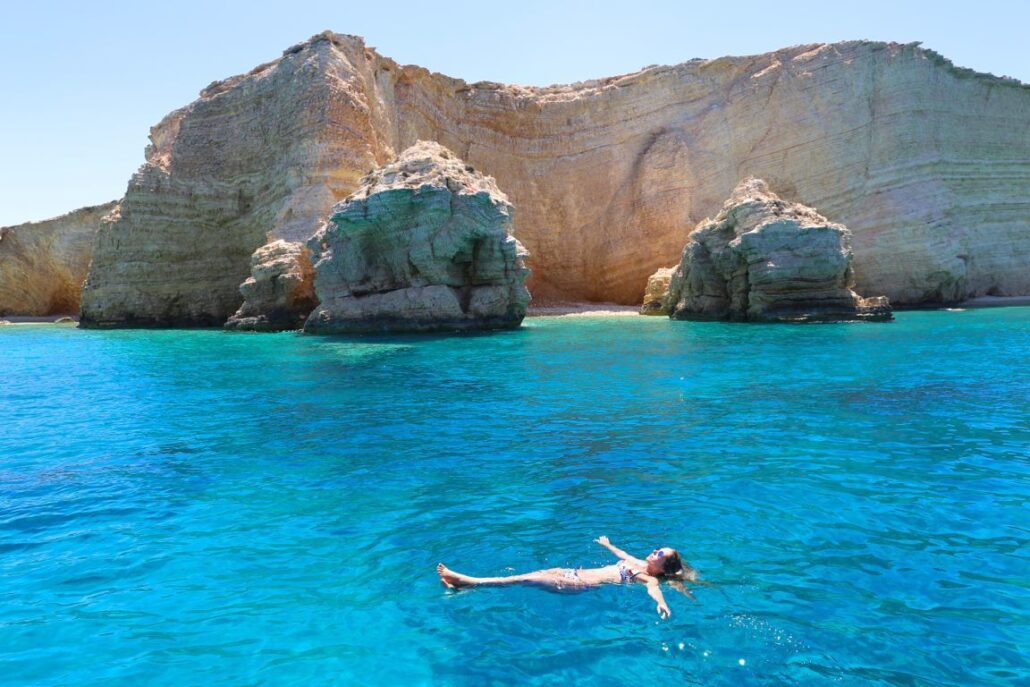
TRANQUILITY & REMOTE GETAWAYS
If you’re searching for silence, beauty, and a deep breath away from the world, Greece is your haven. Beyond the popular hotspots lies a quieter Greece—untouched islands, sleepy villages, and rugged coastlines where time slows, and tranquility takes over.
Escape to lesser-known islands like Folegandros, Koufonisia, or Amorgos, where whitewashed houses tumble down hillsides and the loudest sounds are waves against the shore or bells from a distant chapel. Here, mornings start with sunrises over empty beaches, and afternoons melt away with a book under an olive tree or a hike along ancient footpaths.
On the mainland, head to the Pelion Peninsula, where stone-built villages perch above the Aegean, wrapped in forests and cobbled charm. Or retreat to Epirus, where misty mountains, rivers, and traditional guesthouses create a soul-soothing escape far from the tourist trail.
In the Dodecanese, islands like Symi or Leros offer slow island life with colorful neoclassical towns and secret coves you’ll have entirely to yourself. And in Milos, even the more traveled spots still feel untouched—especially when you’re exploring its lunar-like landscapes and quiet fishing hamlets at golden hour.
Wherever you go, the rhythm is gentle, the people warm, and the views endless. These remote corners of Greece aren’t just places to visit—they’re places to exhale, reflect, and reconnect with what really matters.
Schinoussa • Donousa • Meganisi • Fournoi • Tilos • Lipsoi • Irakleia
If you dream of a vehicle-free holiday where all you need is a good book, a swimming suit, a secluded beach and a taverna serving the catch of the day, you don’t need to look any further. These destinations are some small islands where you are invited to lose track of time and truly enjoy life.
Antiparos • Astypalea • Amorgos • Anafi • Schinoussa • Kimolos • Sikinos
If you seek to experience a wonderful Aegean summer away from the crowds and immerse yourself in tranquility, then these Greek islands are the answer. Once on one of these islands, you can tune out of the hectic routine and find peace and meaning in the details of life; the golden blazing sun above, a rejuvenating dive in the indigo sea, savoring a juicy watermelon by the beach, an evening stroll in their picturesque villages and more.
GENERAL INFORMATION ABOUT GREECE
FACTS & FIGURES
Capital: Athens, the capital, expanded rapidly in the second half of the 20th century. Attikí (ancient Greek: Attica), the area around the capital, is now home to approximately one-third of the country’s entire population.
Population: ~ 11.3 million
Language: Greek (spoken by 99% of the population). Communication in English is easily possible throughout the country. Signage is in both Greek and English language.
Greece is a member of the European Union
Unit of currency: Euro (EUR)
UNESCO World Heritage sites: Greece has an impressive 18 UNESCO World Heritage sites including Delphi, Rhodes Old Town, the mighty Acropolis, Delos, Mycenae, Olympia and may more. (view all: https://whc.unesco.org/en/statesparties/gr )
Airports: the main airports of Greece are Athens and Thessaloniki. The airports of the islands of Santorini, Crete-Heraklion, Mykonos, and Paros are getting more and more busy. They receive domestic flights and charter and international flights.
Throughout the Greek mainland there are airports in Kalamata, Patras, Volos and Preveza-Lefkada that work mainly in summer and receive charter flights from abroad and domestic flights. The most popular islands have airports and serve both domestic flights from Athens and Thessaloniki and charter flights from abroad in summer. The flight time from Athens to the Greek islands ranges from 30-40 min to 1 hour maximum.
Ferries: All Greek islands are easily accessible by daily ferry boats, sea jets or flying dolphins speed boats. Ferries in Greece is a great and comfortable alternative to plane tickets.
The best ways to explore Greece are often onfoot, by boat or by fork.
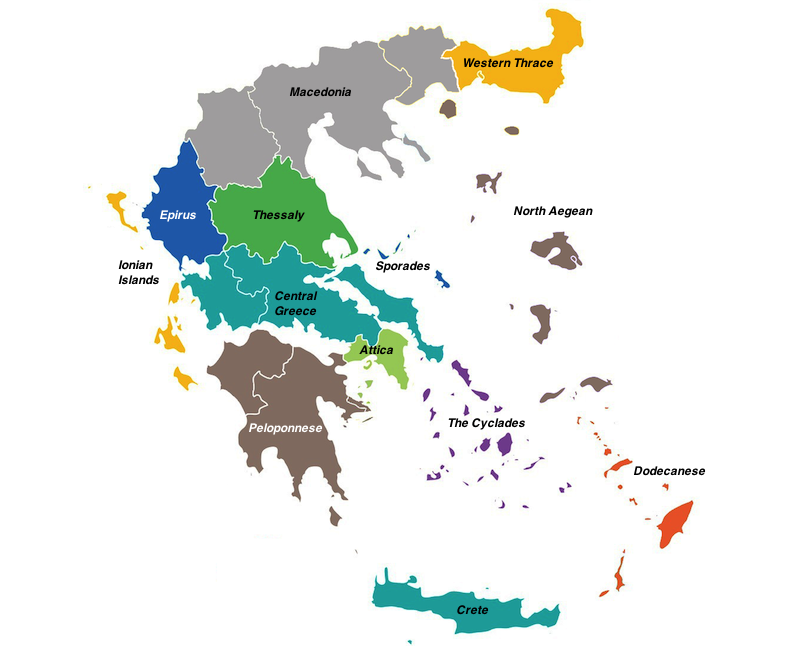
Regions of Greece
The Greek mainland from north to south: Epirus (northwest), Macedonia (north, including Thessaloniki) and Thrace (northeast), Thessaly (east-central), Sterea or Central Greece (including Athens) and the Peloponnese.
Island groups: East Aegean islands, Sporades and Evia (including Skiathos, Skopelos, Alonissos, etc), the Cyclades (including Mykonos, Santorini, Paros, Naxos, Milos, etc), the Dodecanese (east along the Turkish coast incl. Rhodes, Kos, Patmos, Symi etc), the Ionian islands (west, including Corfu, Cephalonia, Lefkas, Zante etc), Saronic (south of Athens, including Aegina, Hydra, Poros, Spetses, etc) and Crete.
Greece enjoys Europe’s warmest climate, with April, May, September and October being ideal times to visit. Greece has a Mediterranean climate with plenty of sunshine, mild air and water temperatures and a limited amount of rainfall. In summer, the dry hot days are cooled by seasonal winds called the Meltemi, while mountainous regions have generally lower temperatures.
Greece is considered an all year round destination due to the great variety of things to do and see. The main season is from March to November with its peak in July and August. June, September and October are highly recommended for luxury travel.
Greece is made up of a mountainous and hilly mainland peninsula and thousands of islands scattered around the Ionian, Myrtoan, and Aegean Seas offering more than 13,500 kilometers of coastline to explore. While some parts of the country are home to dramatic gorges and stunning mountain peaks, others consist of peaceful countryside and beautiful beaches. Wherever you go, you are sure to come across amazing archaeological sites of ancient civilizations shrouded in Greek mythology as well as charming towns and villages displaying the country’s fascinating history. You can visit vibrant metropolitan cities, you can cruise among the islands, you can practice water sports and many other activities and of course, you can savor some of the best food of the Mediterranean kitchen.
Greece lies at the juncture of Europe, Asia, and Africa and owns heritages of Classical Greece as well as the Byzantine and the Ottoman Empire.
The land of Greece comprises almost 132 square kilometres including more than 2,000 islands, of which about 170 are inhabited; The Greek landscape is distinct for its rugged beauty and for its great variety. The dominating elements are the sea, the mountains, and the lowland.
Geography has greatly influenced the country’s development, since mountains historically restricted internal communications, while the sea opened wider horizons. The total land area of Greece (one-fifth of which is made up of the Greek islands) is comparable in size to England or the U.S. state of Alabama.






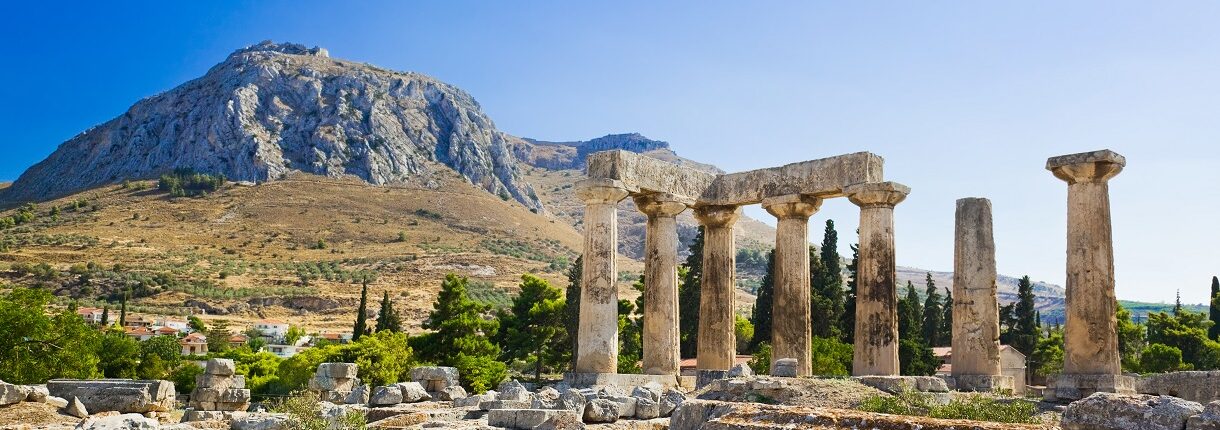
 EXPERIENCE GREEK CULTURE
EXPERIENCE GREEK CULTURE EXPERIENCE GREEK CUISINE
EXPERIENCE GREEK CUISINE